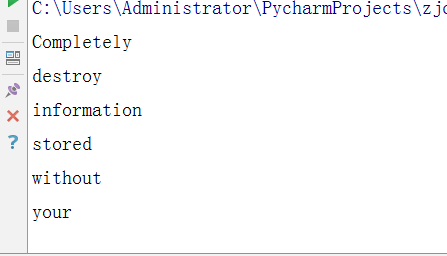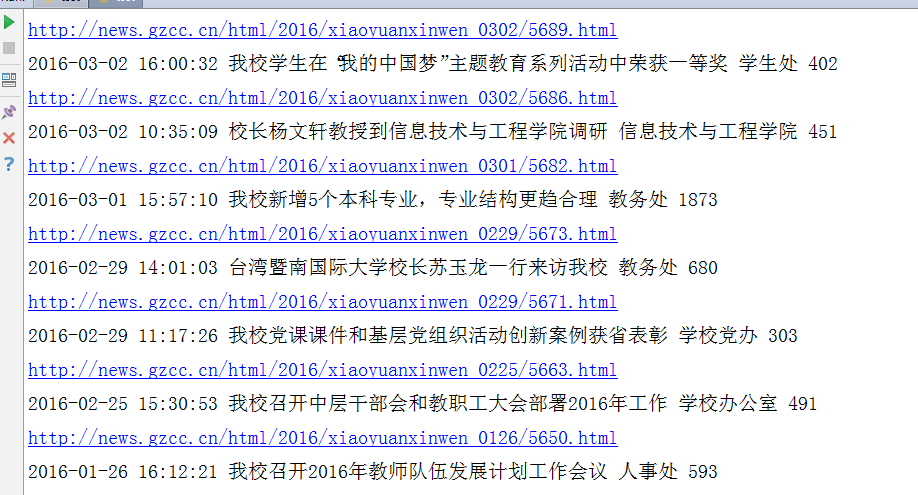使用正则表达式,取得点击次数,函数抽离
学会使用正则表达式
1. 用正则表达式判定邮箱是否输入正确。
r='^(\w)+(\.\w+)*@(\w)+((\.\w{2,3}){1,3})$'
e='67890222@qq.com'
if re.match(r,e):
print(re.match(r,e).group(0))
else:
print('非邮箱格式!')

2. 用正则表达式识别出全部电话号码。
str='''版权所有:广州商学院 地址:广州市黄埔区九龙大道206号
学校办公室:020-82876130 招生电话:020-82872773
粤公网安备 44011602000060号 粤ICP备15103669号'''
r = '\d{3}-\d{8}|\d{4}-\d{7}'
n=re.findall(r,str)
for i in n:
print(i)

3. 用正则表达式进行英文分词。re.split('',news)
str='''Completely destroy information stored without your knowledge or approval:
Internet history, Web pages and pictures from sites visited on the Internet,
unwanted cookies, chatroom conversations, deleted e-mail messages, temporary files,
the Windows swap file, the Recycle Bin, previously deleted files, valuable corporate
trade secrets, Business plans, personal files, photos or confidential letters,
etc.'''
n=re.split(r'[ \t\n]+',str)
for i in n:
print(i)

4. 使用正则表达式取得新闻编号
import re
newurl='http://news.gzcc.cn/html/2018/xiaoyuanxinwen_0404/9183.html'
newid=re.search('\_(.*).html',newurl).group(1).split('/')[-1]
print(newid)

5. 生成点击次数的Request URL
import re
newurl='http://news.gzcc.cn/html/2018/xiaoyuanxinwen_0404/9183.html'
newid=re.search('\_(.*).html',newurl).group(1).split('/')[-1]
res='http://oa.gzcc.cn/api.php?op=count&id={}&modelid=80'.format(newid)
print(res)

6. 获取点击次数
import requests
import re
newurl='http://news.gzcc.cn/html/2018/xiaoyuanxinwen_0404/9183.html'
newid=re.search('\_(.*).html',newurl).group(1).split('/')[-1]
res=requests.get('http://oa.gzcc.cn/api.php?op=count&id={}&modelid=80'.format(newid))
r1=int(res.text.split(".html")[-1].lstrip("('").rstrip("');"))
print(r1)

7. 将456步骤定义成一个函数 def getClickCount(newsUrl):
import requests
import re
def getClickCount(newsUrl):
newid=re.search('\_(.*).html',newsUrl).group(1).split('/')[-1]
res=requests.get('http://oa.gzcc.cn/api.php?op=count&id={}&modelid=80'.format(newid))
return int(res.text.split(".html")[-1].lstrip("('").rstrip("');"))
8. 将获取新闻详情的代码定义成一个函数 def getNewDetail(newsUrl):
def getNewDetail(newsUrl):
resd = requests.get(newsUrl)
resd.encoding = 'utf-8'
soupd = BeautifulSoup(resd.text, 'html.parser')
title = soupd.select('.show-title')[0].text
info = soupd.select('.show-info')[0].text
ti = datetime.strptime(info.lstrip('发布时间:')[0:19], '%Y-%m-%d %H:%M:%S')
if info.find('来源:') > 0:
source = info[info.find('来源:'):].split()[0].lstrip('来源:')
else:
source = 'none'
click = getClickCount(newsUrl)
print(ti, title, source, click)
9. 取出一个新闻列表页的全部新闻 包装成函数def getListPage(pageUrl):
def getListPage(pageUrl):
res = requests.get(pageUrl)
res.encoding = 'utf-8'
soup = BeautifulSoup(res.text, 'html.parser')
for news in soup.select('li'):
if len(news.select('.news-list-title')) > 0:
g = news.select('a')[0].attrs['href']
print(g)
getNewDetail(g)
10. 获取总的新闻篇数,算出新闻总页数包装成函数def getPageN():
def getPageN():
res = requests.get('http://news.gzcc.cn/html/xiaoyuanxinwen/')
res.encoding = 'utf-8'
soup = BeautifulSoup(res.text, 'html.parser')
pagenumber=int(soup.select('.a1')[0].text.rstrip('条'))
page = pagenumber//10+1
return page
11. 获取全部新闻列表页的全部新闻详情。
pageUrl = 'http://news.gzcc.cn/html/xiaoyuanxinwen/'
getListPage(pageUrl)
n = getPageN()
for i in range(2, n + 1):
listPageUrl = 'http://news.gzcc.cn/html/xiaoyuanxinwen/{}.html'.format(i)
getListPage(listPageUrl)




 浙公网安备 33010602011771号
浙公网安备 33010602011771号